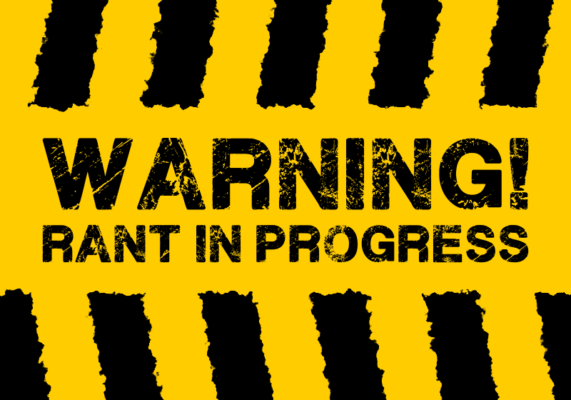In Linda Morel’s lesson plan, students pick something they strongly oppose and write a rant expounding on what is wrong with it.
Lesson Overview
Grade: 4th
Genre: Poetry
Download: The Poetic Rant
Common Core State Standards (Refer to the ELA Standards > Writing > Grade 4):
ELA-LITERACY.W.4.1.A: Introduce a topic or text clearly, state an opinion, and create an organizational structure in which related ideas are grouped to support the writer’s purpose.
ELA-LITERACY.W.4.2.B: Develop the topic with facts, definitions, concrete details, quotations, or other information and examples related to the topic.
LESSON
Warm-up activity: Group (10 minutes)
- Class discussion: What is a rant? A rant is a running, even screaming, criticism of an activity, habit, practice, or custom you intensely dislike. A rant is a persuasive argument.
- Read Road Dahl’s poem “Television” aloud. Each group of students reads several lines.
- Discuss what Dahl opposes. Students point out the many places in the poem he goes into explicit detail about what is wrong with television watching.
- Review of strong point of view.
- Review of staying on topic. While it is not necessary to rhyme the way Dahl does, it is necessary to remain focused on the topic. Don’t get snagged into the pitfall of rhyming and wandering away from the topic.
Main Activity: Group (10 minutes)
- Discussion of rich topics to rant about. Students must know a lot about the subject to rant about it. Write them on the SmartBoard.
- When writing their poems, students should tell what goes wrong when people do the thing they oppose. They can be wacky like Dahl: television causes eyeballs to fall out, it makes people drunk.
- Students should name things that are tempting: when kids watch TV, their parents can make lunch and do the dishes.
- But what price do they pay: television rots the brain and kills imagination dead.
- Model a rant on the SmartBoard.
- Review–writing in poetry style, in the center of the page.
Group (15 minutes)
- Students write their poetic rants.
Closing: Group (10 minutes)
- Some students read their poems aloud.
- Classmates discuss the strengths of these poems and what, if anything, would benefit from revision.
Materials:
- Access to eraser board, SmartBoard, or easel
- Copies of “Television” by Roald Dahl
- Lined paper for students to write their poems
Vocabulary: Rant, persuasive writing, point of view, staying on topic
Multi-Modal Approaches to Learning:
- Aural: reading the poem aloud
- Interpersonal: class discussion, participation, and critique
“Traffic Jams”
By Daniella Bellizzi
4th-grade teacher at PS 153, Helen Keller School, BronxThe most important thing we’ve learned,
so far as adults are concerned,
Is never, NEVER, NEVER let an early
morning traffic jam cause havoc in your
brain—
Ruining your mood as you set off to work
or to school to educate, learn and grow
yet the congested cars makes this process
slow—
Getting here and getting there with a
traffic jam makes for a stressful early
morning commute—
Long, yellow buses, delivery trucks and
city buses head to their destinations for
drop offs, deliveries and pick ups—
Too many people, too many cars
Trying to move along on a going nowhere
road—
While time is ticking,
Horns are honking,
Street signs are shining,
Streetlights are looming
And voices are venting
“HURRY UP” and “MOVE ALONG” from
rolled down windows
Sense of panic, anxiety and frustration
Racing thoughts . . .
“I won’t be late! I can’t be late!”
Driving to my destination to change the
world
In a world that seems hard to change
Learning to adapt and accommodate
Have you forgotten? Don’t you
remember?
We’ll say it loud and fast:
Wake up before the rest of the world does
to arrive on time without the stress of
such a jam and keep in mind . . .
To STOP, PLEASE STOP pressing the . . .
Snooze Button!!
“Brothers”
By Doreen A., PS 153 4th-graderThe most important thing we’ve learned,
So far as siblings are concerned,
Is NEVER, EVER
Ask for a boy,
Because he will steal your toys.
And he’ll NEVER let you watch TV.
My point is, little boys are mean.
If you are calling your best friend,
He’ll take the phone and say, “the end.”
It’s very hard to do your work,
If your brother rips up your book.
Guess what he’ll do on your birthday.
He’ll blow out your candles and eat your cake!
“Stop Ads”
by Eric A., PS 153 4th-graderThe most important thing we’ve learned,
As far as people are concerned,
Is never put on an ad
In the middle of a good TV show.
It’s sad,
When we come to the best part of all,
And ads come
Straight out of the wall!
If the breaks were short,
I would be okay.
But they are not,
I mean, not today.
And here is just a note
To TV companies:
Stop putting on ads!
We are on our knees!



